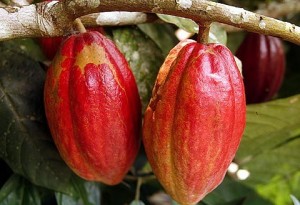Cocoa prices at 10-year low will put pressure on Ghana and Côte d’Ivoire economies – Moody’s
 Ghana and Côte d’Ivoire are the two leading producers of cocoa in the world, but the prices of cocoa at a 10-year low is expected to put pressure on the economies of the two countries.
Ghana and Côte d’Ivoire are the two leading producers of cocoa in the world, but the prices of cocoa at a 10-year low is expected to put pressure on the economies of the two countries.
In the 2015/2016 production year, Ivory Coast produced a total of 1.7 million metric tonnes of cocoa and Ghana produced some 840,000 tonnes. Ghana is targeting one million metric tonnes for the 2016/2017 production year.
In a press release citing a report which was copied to ghanabusinessnews.com, the rating agency, Moody’s says, while cocoa prices at a 10-year low will put pressure on the economies and fiscal position of Côte d’Ivoire and Ghana, both countries will be able to withstand short-term price fluctuations. Current average cocoa prices reflect a drop of around 30 per cent compared to mid-2016.
The report titled, “Sovereigns – Africa: Côte d’Ivoire and Ghana Resilient to Credit Pressures from Fall in Cocoa Prices”, according to Moody’s, is an update to the markets and does not constitute a rating action.
Moody’s points out that, although Africa produces close to 74 per cent of global cocoa, the continent accounts for only around 20 per cent of the grinding process. It has also been stated elsewhere that, while the global chocolate industry is worth $100 billion a year, only 2 per cent gets to Africa.
“Unlike manufacturers and traders that are concentrated in a small number of companies and enjoy higher bargaining power, farmers receive a very small share (6-7 per cent) of the value distribution in the supply chain. Household revenue is more exposed to the volatility in prices as the agriculture sector employs about two-thirds of the population in Côte d’Ivoire and over 40 per cent in Ghana,” it says.
The report notes that the impact of the cocoa price fall on the current account balance will be more significant for Côte d’Ivoire than Ghana because cocoa exports accounted for around 43 per cent of its total merchandise exports in 2015, compared to 24 per cent in Ghana.
Moody’s says it expects that for Côte d’Ivoire, lower cocoa prices and higher investment-related imports will increase the current account deficit to 2.7 per cent of GDP in 2017, from 0.6 per cent in 2016 and compared to a surplus of 0.7 per cent over 2014-15. Lower exports will also weigh on growth.
In Ghana, however, Moody’s says it expects the current account deficit to improve to 6.3 per cent of GDP in 2017 from 6.6 per cent in 2016, amid higher GDP growth supported by new oil and gas field developments.
Over the longer-term, growing demand for chocolate in developing markets suggests that low prices – although still possible – are unlikely to persist for many years, it adds.
Aurélien Mali, a Moody’s Vice President – Senior Credit Officer and co-author of the report, was quoted as saying, “The 30 per cent drop in cocoa prices will put pressure on all stakeholders in the cocoa sector, but particularly Côte d’Ivoire and Ghana, through the current account, fiscal and economic channels. That said, minimum farm gate prices have protected farmers in Côte d’Ivoire from the short-term fluctuation in prices, while Ghana’s burgeoning oil sector will help to offset the impact on its credit profile.”
The report notes that although Switzerland, the United Kingdom, Germany and the United States remain the top chocolate consumers, these markets are already fully penetrated.
“On a per capita basis, Switzerland annually consumes around 9.2 kg of chocolate and the average Western European consumes 4.7 kg, while consumption for China and India only stands at around 0.1 kg, indicating further potential for cocoa production to meet growing demand over time as those markets are likely to deepen,” the report says.
By Emmanuel K. Dogbevi
Copyright ©2017 by Creative Imaginations Publicity
All rights reserved. This news item or any portion thereof may not be reproduced or used in any manner whatsoever without the express written permission of the publisher except for the use of brief quotations in reviews.
